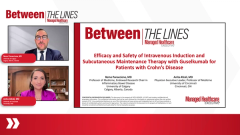
Expert Discussion on Safety Results of Guselkumab for Crohn’s Disease
Panelists discuss how guselkumab demonstrated a very reassuring safety profile with no new safety signals or unexpected adverse events compared with placebo and consistent with safety data from other disease indications, requiring no different monitoring protocols than standard care for Crohn’s disease patients on advanced therapies, while emphasizing that uncontrolled disease itself represents the biggest safety concern.
Episodes in this series

Expert Discussion on Safety Results of Guselkumab
Comprehensive Safety Profile Assessment
The safety evaluation of guselkumab in the GALAXI-2 and GALAXI-3 studies revealed a highly reassuring profile with no new safety signals or unexpected adverse events beyond those previously observed in other disease indications. The safety data demonstrated no meaningful differentiation from placebo across most adverse event categories, providing strong clinical confidence in the therapy’s tolerability. Notably, serious infections and serious adverse events occurred at higher rates in the placebo group compared with the guselkumab treatment groups, further supporting the favorable safety profile. Minor injection site reactions were observed, consistent with typical subcutaneous drug administration patterns, but these did not represent clinically significant concerns. The safety findings align with existing long-term data from psoriasis and psoriatic arthritis indications, providing additional reassurance regarding the medication’s safety across different patient populations.
Clinical Monitoring and Management Protocols
Expert consensus indicates that guselkumab therapy for Crohn’s disease does not require specialized monitoring protocols beyond standard inflammatory bowel disease management practices. Clinicians should maintain their established monitoring strategies, ensuring patients remain current with immunizations and vaccinations while avoiding live vaccines during treatment periods. Standard infection surveillance protocols apply, with therapy interruption indicated for active, uncontrolled infections, similar to management approaches for other advanced therapies. Patient-related factors, medical comorbidities and routine quarterly monitoring remain important components of care, consistent with initiating any advanced therapeutic intervention. The monitoring approach should be individualized based on patient characteristics rather than medication-specific requirements.
Risk-Benefit Considerations and Clinical Context
The safety analysis reinforces a fundamental principle in inflammatory bowel disease management: Uncontrolled disease represents the greatest safety concern for patients. The placebo group’s higher adverse event rates underscore the importance of achieving and maintaining disease control through effective therapy. The excellent safety profile potentially allows for less intensive monitoring compared with some other advanced therapies, although clinicians should maintain their standard protocols. The favorable risk-benefit ratio and demonstrated efficacy support guselkumab’s positioning as a safe and effective treatment option for moderate to severe Crohn’s disease. The consistency of safety data across multiple disease indications provides additional clinical confidence for long-term therapeutic use in inflammatory bowel disease populations.
Newsletter
Get the latest industry news, event updates, and more from Managed healthcare Executive.






















